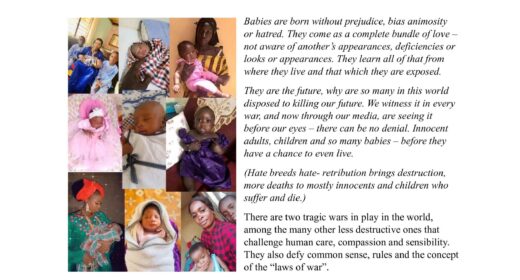Much of my time and energy here in The Gambia is spent in contemplation, especially around the evident economic and social disparities and the development challenges required to bring about better balance.
A recent visit to Ukraine and Germany visiting friends and colleagues and witnessing the obvious disparities between each of these countries and with The Gambia provided sharp focus for many of my thoughts. The dilemmas that ordinary people face need and require deep and soulful thought; not only by economists and politicians, but by everyone.
More than anytime in history, there is need for quiet and serious contemplation.
There is need for reflection to what is happening around us, to our lives and to the world in which we live. More importantly, we need consider the impact on our humanness.
It would appear that most only stop to think when there is a crisis engulfing them. There are challenges facing every sector and class in societies everywhere; ultimately they impact us all.
Older people in developed societies have to deal with the dilemma of how to support themselves or even survive. All pensions (private or government) are under severe duress. The real question is whether there will be pensions at all, when those in charge of financial institutions are allowed to pilfer what ever investment income or interest that is accruing for their own benefit.
The middle class, or what’s left of it, is a declining concept, as people are being squeezed out of existence by unemployment, debt, taxes and government policies, while taxes are being reduced or eliminated for corporations and the rich.
The young have to contemplate how to earn a living, when the concept of “a job” is being made redundant. There are bigger concerns for those unable to acquire a decent education, which is getting harder to achieve as each year goes by.
People with health issues, aging populations present a whole new set of such issues, have to consider what will happen if our systems are allowed to fragment or fail as they are doing now.
Then, of course, there are the poor, those almost forgotten, as governments diminish or eliminate social support. Social support is now considered by many an entitlement for the lazy. One politician recently described it as a Ponzi scheme and a lie. Forgotten is its original intent as an investment in people.
When one has the good fortune to travel and compare different economic circumstances all these contemplations appear more vivid, as one actually sees them in real life. There are societies where there is no concept of middle class and social support is non existent; their concerns are much more fundamental. In other countries a middle class is but a dream, as people try to create one with the minimal social support available; their struggle is considerable.
The ranks of the poor are swelling with those from the middle class. It appears that there are some, especially those with excess wealth, who believe that social support, which helped built the middle class was a flawed idea or one that has gone bad and thus must be eliminated.
The situation that currently exists throughout the world has much in parallel to the era of the 1930’s. There is continuing financial crisis, acute unemployment (much higher than official statistics) and a dramatic rise in fanatical right wing thought; even fascism.
During the lead up to the last depression there were evident leaders that held different ideologies and had more human compassion to counter the far right and fascists who had taken power. As a result, the world survived not only a global depression, but a disastrous world war and spawned an era of social consciousness that allowed for many people in the world (not all) one of history’s most progressive periods.
There is scant evidence of any such latent leadership in western and developed countries today. Radical conservative ideologists appear in control in many developed countries, and in others, they have such influence that it will only be a matter of time before they take control.
Those of this extreme right and others who are religious fanatics (not only foreign terrorists) are advocating the destruction of the very basis and foundations of democratic and economic progress built since the last depression. Their rationale is one of ideology rather than real economics or compassion. Realize that they are not only fully engaged in contemplation, but are actively orchestrating destruction.
It appears that most people let others do their thinking, perhaps believing that it is much too complex for them or that these issues are only pertinent elsewhere. Maybe they genuinely feel that those in power will do what is right.
History would suggest that this is unlikely, as most with wealth and power will ultimately protect themselves, with little regard for the impact on those less fortunate. Some of them even postulate that it’s their god given right to horde such wealth; they are being rewarded and all others are being punished for some unknown transgression.
One thing that is certain that never before has quiet contemplation been so necessary (even in a world full of noise) to preserve the foundations of a once moral and compassionate society built with the sacrifices of so many. In the world, not everyone benefitted from it, but it was aspired to by all; even those at a distance.
Written by Bill Pardy
September 25, 2011


